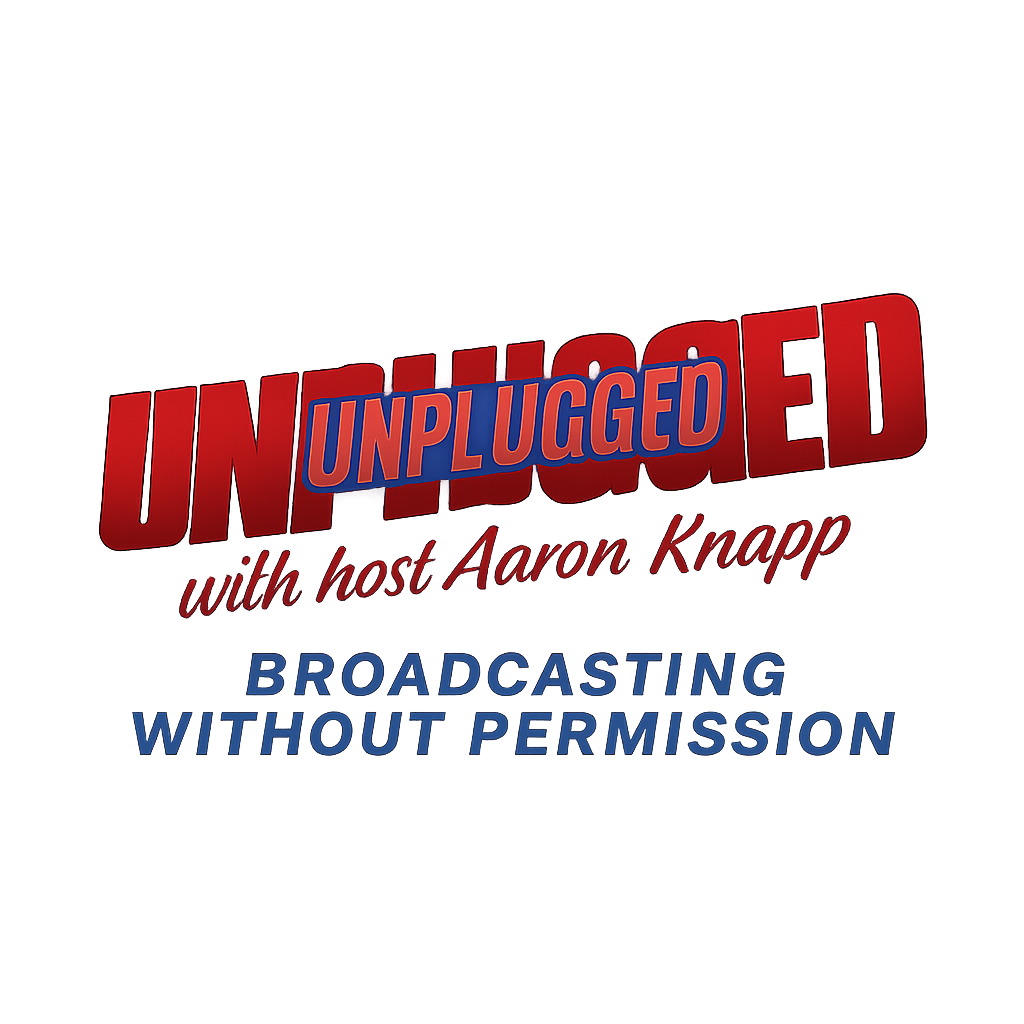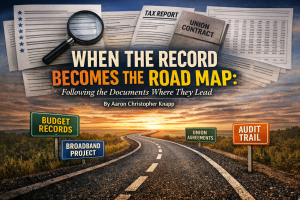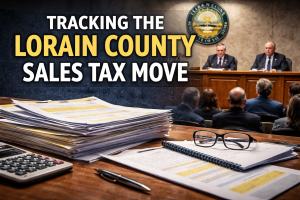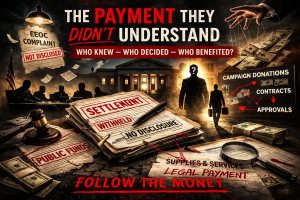When the Sheriff Says “No Obligation”
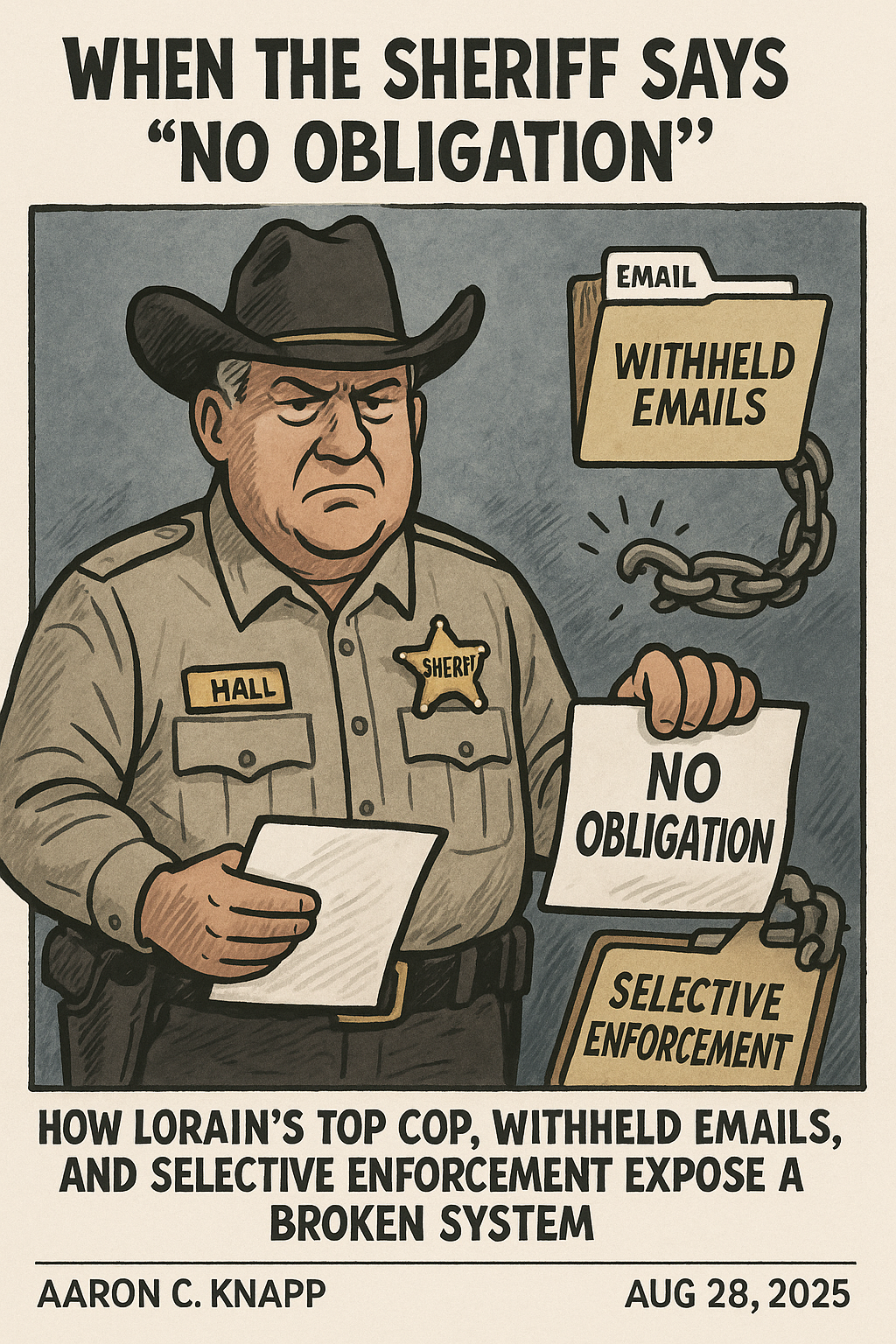
How Lorain’s top cop, withheld emails, and selective enforcement expose a broken system
Aug 28, 2025
Introduction: From Ally to Afterthought
For the last year, I was not just another name in Jack Hall’s inbox. I supported him. I helped build his campaign website. I assisted one of his associates in drafting a mental health companion program for the Sheriff’s Office. I publicly vouched for him when others doubted his candidacy. I gave my time and my credibility to the belief that Hall could be the reformer Lorain County needed.
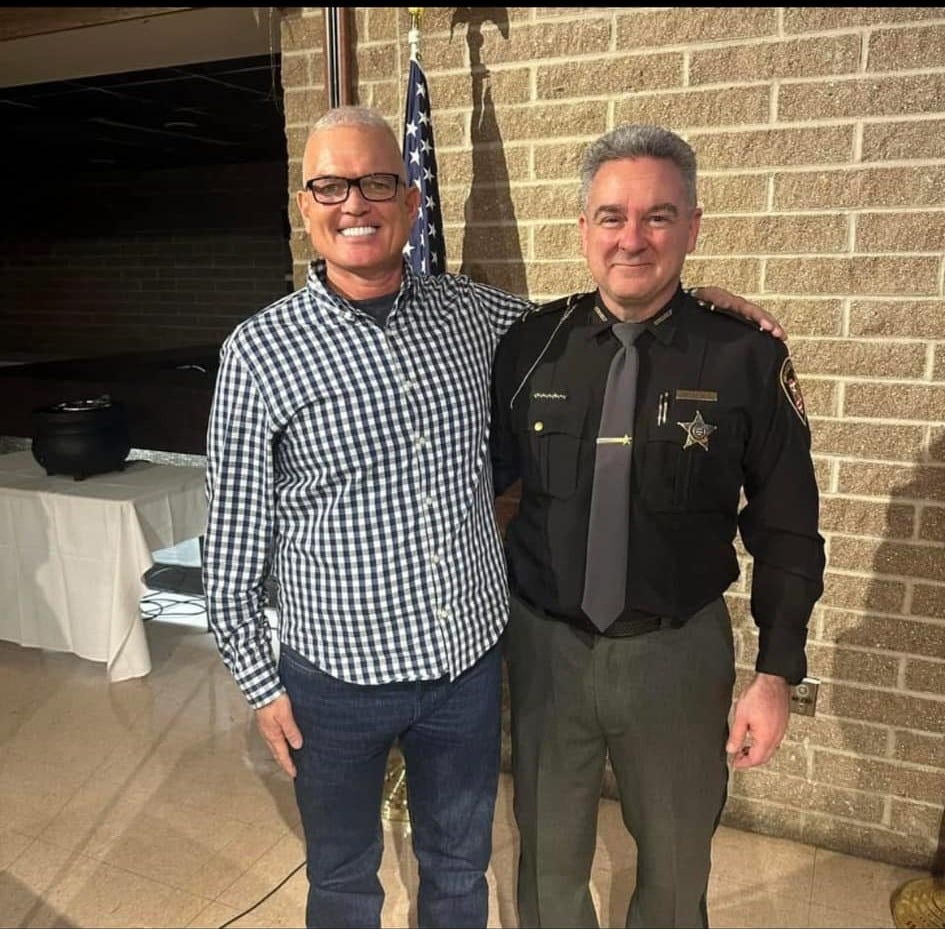
But this week, when I raised serious questions about whether Councilman Antonio Baez’s dual service as a full-time Sheffield Lake police officer and an elected Lorain City Council member violated Ohio law, Hall’s sudden response was not one of integrity. It was defensive, dismissive, and ultimately, it was a betrayal.
Thanks for reading Aaron’s Substack! Subscribe for free to receive new posts and support my work.
This is not about demanding special treatment. It is about demanding consistency. If Marsy’s Law can be invoked to redact names in cases where no crime was ever charged, then it should be applied when citizens like me provide verified evidence of misconduct by a sitting police chief. The law must mean the same thing for everyone, or it means nothing at all.
Selective Silence, Sudden Response
To understand the context: my recent email wasn’t even directed at Hall. It was sent to the Lorain Law Department, which had publicly admitted to the Chronicle-Telegram that it was investigating Councilman Baez’s eligibility. Hall was simply copied as a courtesy.
Yet Hall jumped in as though I had demanded updates from him. In a letter he knew I would likely publish, he wrote:
“I have no obligation to update you on the status of any investigation conducted by my office before or during any part of an investigative process.”

That framing lets him sidestep the real issue. This wasn’t about whether the Sheriff owes me updates. It was about whether Baez’s dual role violated Ohio Revised Code §124.57, which bars classified employees from partisan politics, and §124.34, which governs tenure and removal.
Baez’s police oath prohibited partisan candidacy and service. Yet he simultaneously sat on Lorain City Council, casting votes on ARPA appropriations and budget matters. That’s not a minor oversight — it calls into question the validity of his votes and potentially rises to criminal falsification under R.C. 2921.13 if he swore to uphold laws he was actively violating.
Hall had already told me personally he wouldn’t investigate Baez because I had taken the matter to the Ethics Commission. Fine. But then why treat my email to the Law Department as if it were addressed to him? Why step in only to assert “no obligation”? The answer seems less about law and more about image management — a defensive move under political pressure.
The Pattern With McCann
This selective deflection by Sheriff Hall is not unique. It is part of a larger pattern — one I have already experienced at the hands of Chief James McCann.
Falsehoods to a State Agency. On June 1, 2023, McCann wrote to the Ohio Counselor, Social Worker, and Marriage and Family Therapist Board, claiming I had admitted to being trespassed from government buildings in other states. He named Lieutenant Tim Thompson as the source of this supposed confession. The problem? It was a fabrication. No such admission exists. No trespass records exist. He invented it.
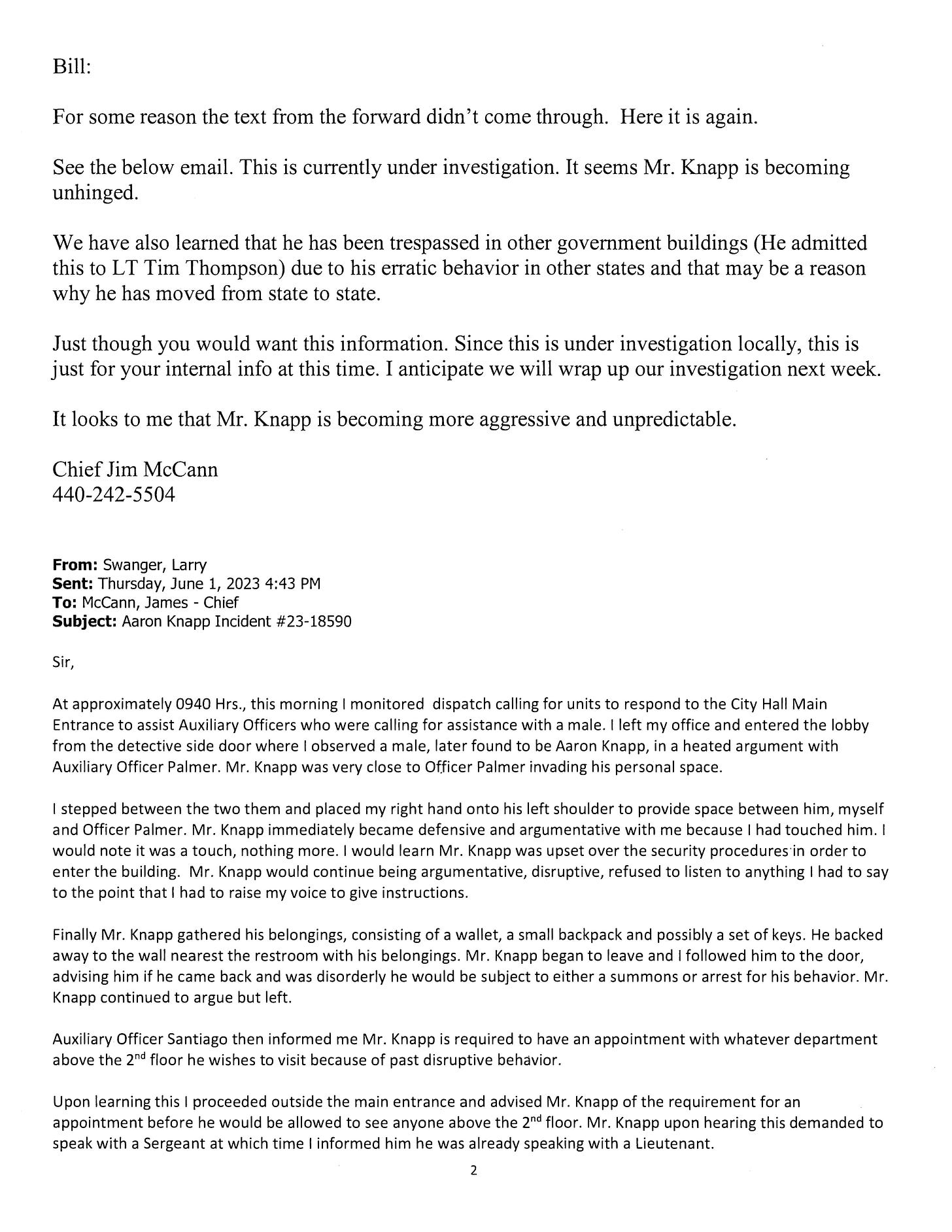
Weaponizing Confidential Channels. McCann did not confine this to city business. He funneled his allegations to my professional licensing board, an outside agency with the power to revoke my career. He sent defamatory emails to court administrator Tim Weitzel, explicitly warning him to keep them “close to the vest.” These were not mere workplace gripes. They were targeted attempts to destroy my professional reputation using the authority of his badge.
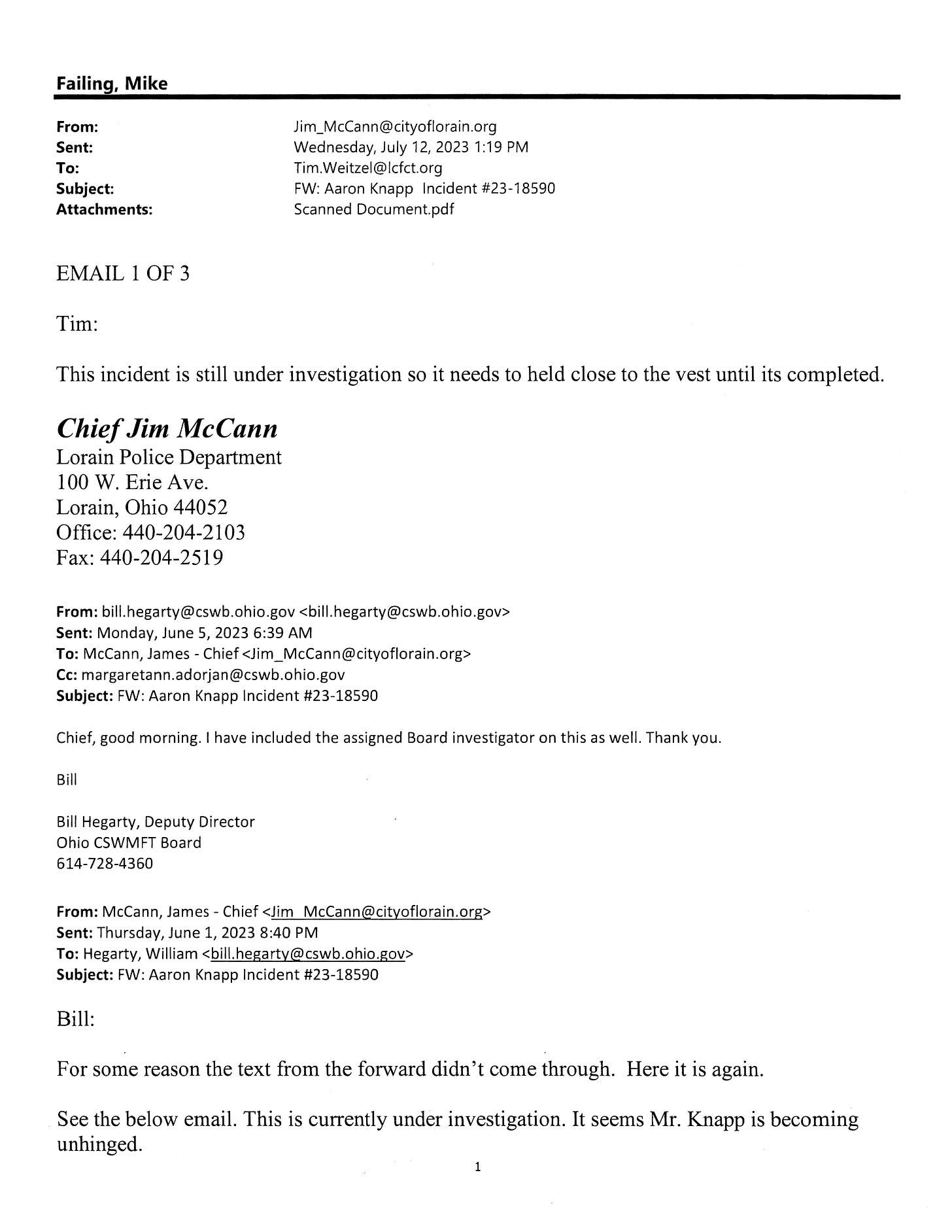
The Board’s Response. The CSWMFT Board dismissed his complaint in July 2023. They found no wrongdoing. They issued no sanction. They confirmed his allegations had no merit. But the damage was done. I was forced to defend myself against baseless charges for months because McCann abused his office to trigger the process in the first place.
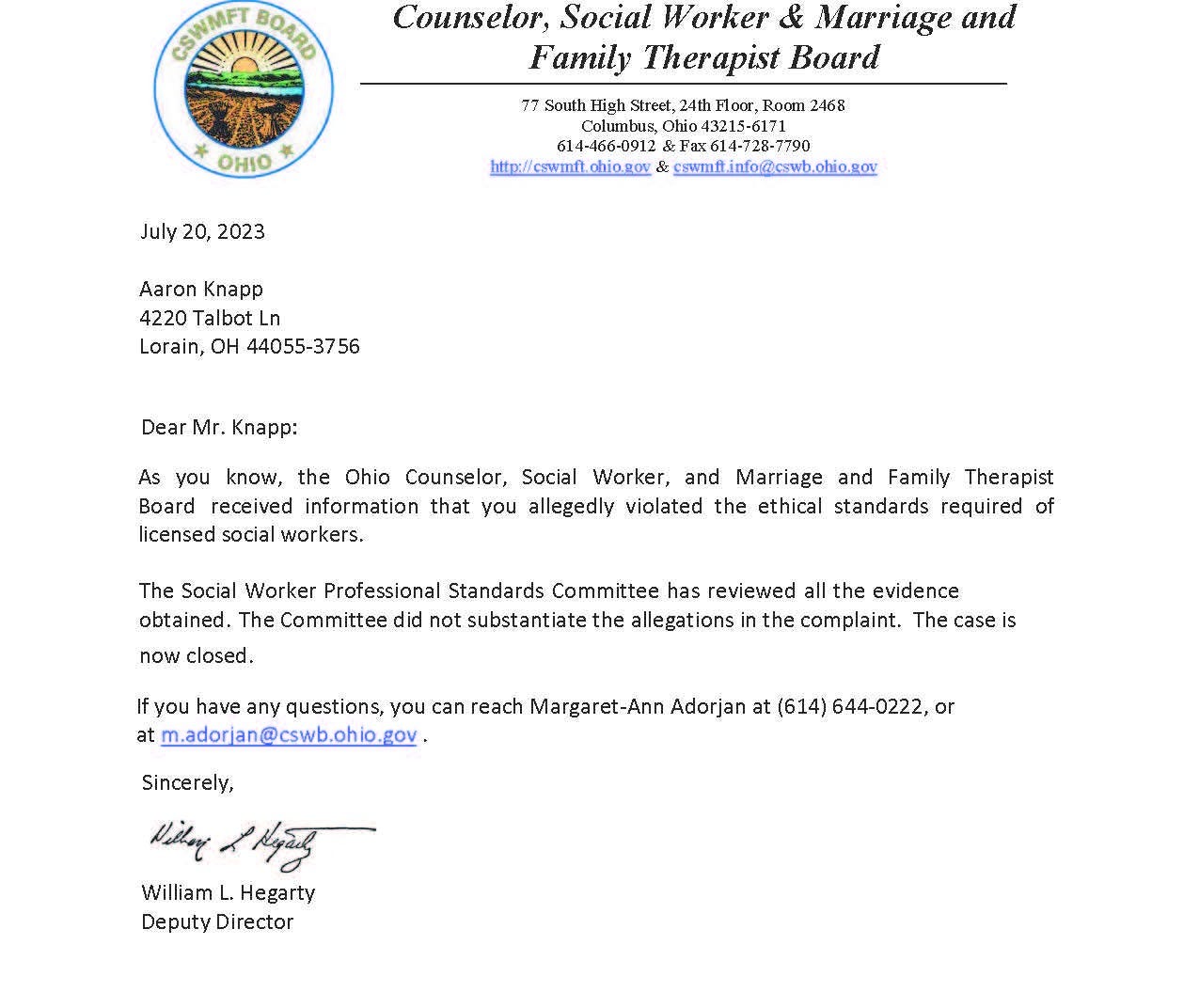
Employment Retaliation. Within weeks of McCann’s correspondence, my employer suspended me without pay. Eventually, I was terminated. I applied for unemployment and won. The Ohio Department of Job and Family Services concluded my separation was “without just cause.” That state finding directly undercuts McCann’s story that I had engaged in misconduct.
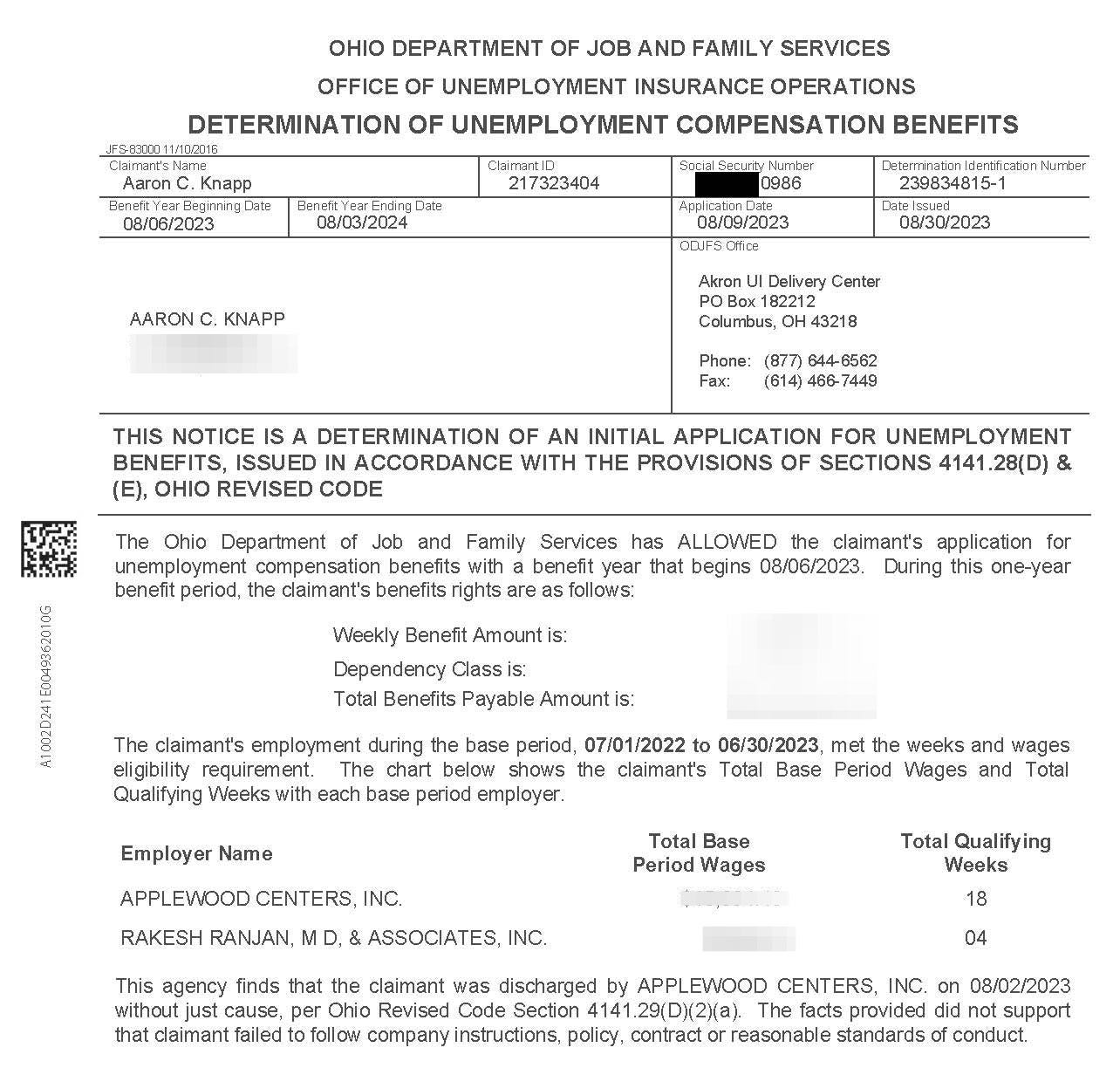
Confidential Leaks. McCann also released juvenile names and sealed records in violation of ORC §2151.356 and FERPA. These were not mistakes. They were acts of exposure designed to smear and intimidate.
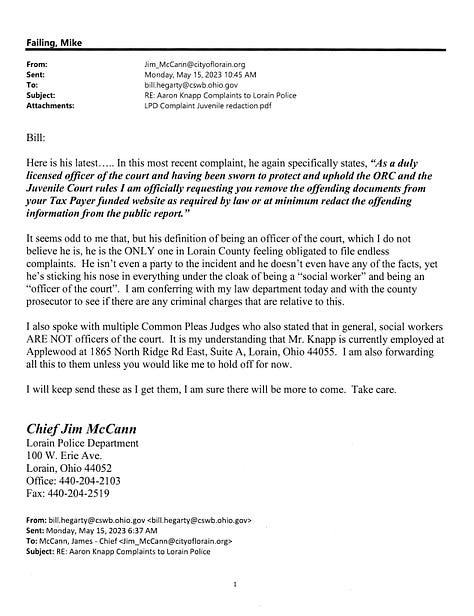
Continued Harassment. Even after Safety-Service Director Rey Carrion ordered him to stop contacting me, McCann kept emailing me. Under ORC §2917.21, that is telecommunications harassment — a crime, plain and simple.
Every element of McCann’s conduct maps directly onto Ohio statutes:
- ORC 2921.13 – Falsification. False statements to a state board.
- ORC 2921.05 – Retaliation. Punishing me for protected speech and records requests.
- ORC 1347.12 – Unauthorized Disclosure. Leaking sealed juvenile information.
- ORC 2917.21 – Harassment by Electronic Communication. Repeated emails after a lawful demand to cease.
Add to that federal law: 42 U.S.C. §1983, which prohibits retaliation under color of law. McCann’s behavior was not just misconduct — it was a civil rights violation.
And yet, despite the evidence, despite corroborating exhibits, despite state agencies ruling in my favor, there has been no investigation. No charges. No recognition of my victim status. Silence.
Marsy’s Law: A Shield for Some, Silence for Others
Now compare that silence to how Marsy’s Law has been applied in Lorain County.
On April 12, 2025, Sheriff’s deputies handed Tia Hilton a Victim’s Rights Form. Her name was redacted in reports under the supposed authority of Marsy’s Law. She was treated as a victim on paper, offered protections and a legal posture designed for survivors of real crimes. Yet no charges were ever filed. There was no indictment, no prosecution, not even a misdemeanor complaint. The Sheriff’s own attorney, Anthony Nici, admitted in black and white that “no criminal act” had occurred.
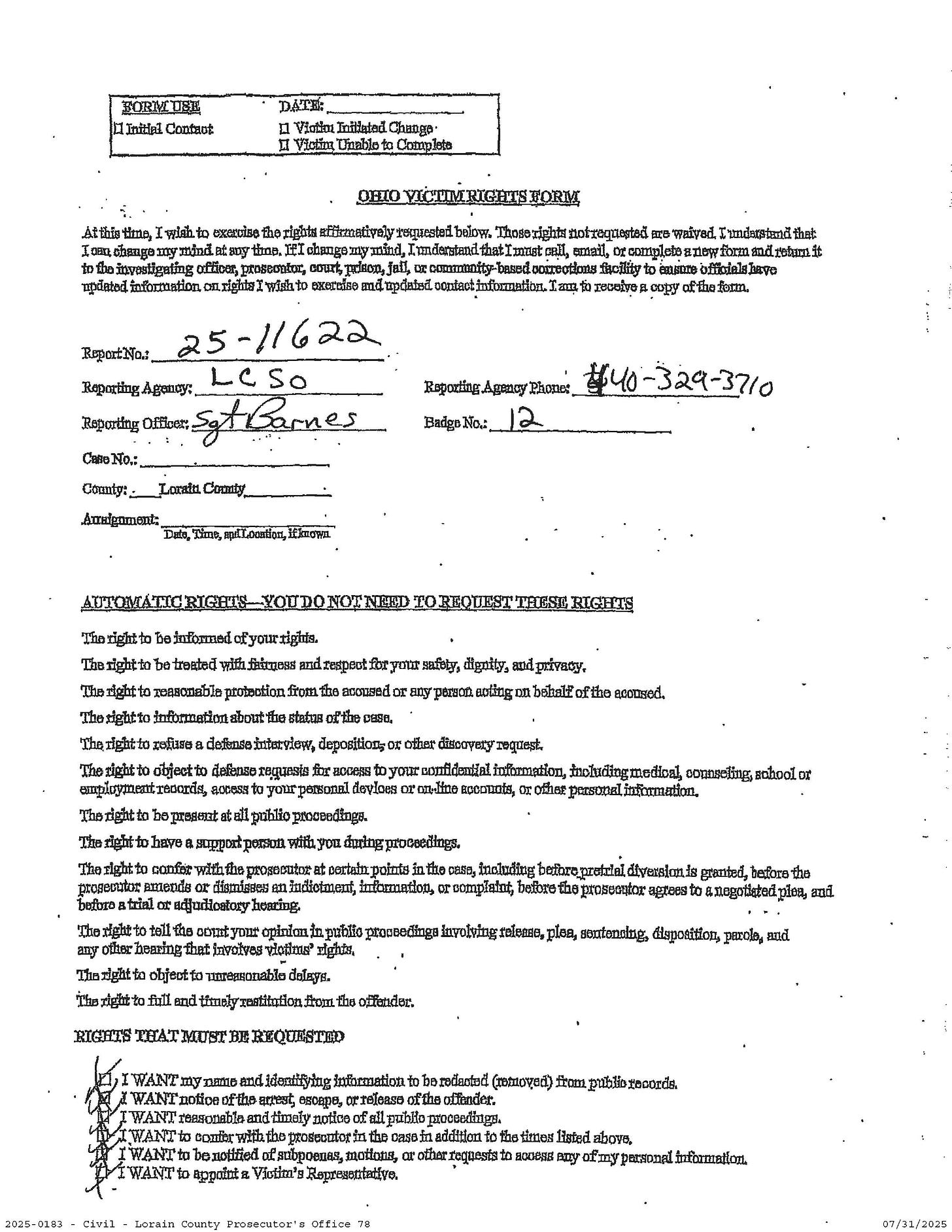
This matters because Marsy’s Law wasn’t designed to be a political shield. When Ohio voters approved it in 2017, the amendment was pitched as a guarantee that crime victims would not be sidelined in prosecutions — that they would have notice of hearings, the right to be heard, and the right to safety once a case was moving forward. The Ohio Supreme Court has made the limits explicit: in State ex rel. Summers v. Fox, Shaffer v. Budish, and Burfitt v. Sehlmeyer, the Court held that Marsy’s Law rights attach only when there is an active criminal prosecution. Without charges, there can be no “victim” under the law.
And yet in Lorain County, the definition of victimhood has been turned inside out. Hilton was given victim status absent charges. Her name was shielded from public view despite the Sheriff’s own office closing the case. She was granted protections Marsy’s Law never intended for her to receive.
Meanwhile, I — the target of verified retaliation by Chief McCann — was denied even the courtesy of recognition. McCann’s falsified statements to a state licensing board. His unlawful release of sealed juvenile records. His continued harassment through email after I demanded it stop. His interference with my employment, which the Ohio Department of Job and Family Services determined was “without just cause.” Each of these is documented, corroborated, and tied to statutory violations. And yet in my case, no victim’s rights forms were filed, no protections were extended, and no recognition was given.
This is not just a legal contradiction; it is a moral one. If Hilton can be a “victim” absent charges, why can’t I be one when retaliation, falsification, and harassment are documented in black and white? If victim rights can be handed out before a case exists, why can’t they be honored when the evidence is already sitting in public records?
The answer is as troubling as it is clear: in Lorain County, victimhood is not defined by law. It is defined by politics.
Weaponizing a Protection Order
The silence ends when the roles are reversed. This spring, a civil stalking protection order was filed against me. On its face, it was boilerplate: a standard order under ORC §2903.214, prohibiting threats, abuse, contact, or approaching within 500 feet. These are routine clauses judges use every day.
But what happened next was anything but routine.
Improvising the Order. Deputies and prosecutors took that standard language and stretched it into something it never said. In April 2025, they claimed my Substack hashtags — metadata tools used to group articles — constituted “indirect contact” with the petitioner. They treated commentary on public officials, written for a general audience, as if it were a personal communication in violation of a court order.
The Evidence. Reports explicitly cite my hashtags as the alleged violation. One deputy admitted the trigger was a Facebook share of my article, where my reporting was visible. Not a message. Not a phone call. Not a letter. A hashtag.
The Constitutional Problem. Protection orders are designed to prevent threats and harassment, not to gag public speech. Expanding them into bans on commentary crosses directly into First Amendment territory. Courts have held repeatedly that vague, overbroad restrictions cannot be used to criminalize protected expression. Treating hashtags as “contact” is not enforcement. It is improvisation. It is censorship.
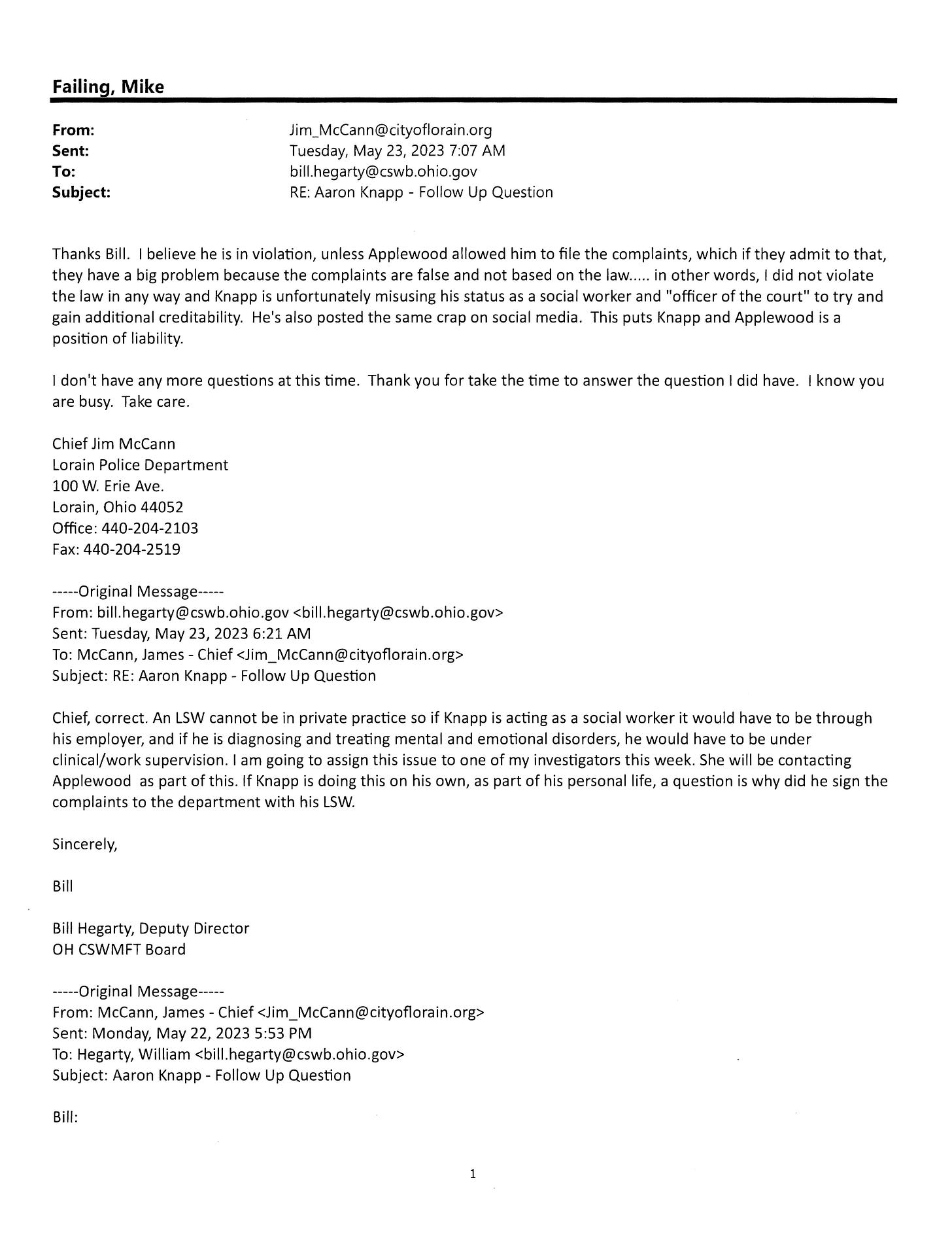
The Double Standard. Meanwhile, when McCann uses his office to retaliate, falsify, and leak confidential records — acts that squarely meet the elements of state and federal crimes — there is no action. No urgency. No “improvisation” of statutes to hold him accountable. The Sheriff’s Office is quick to weaponize vague terms against a citizen, but paralyzed when the misconduct comes from inside the system.
If hashtags are enough to bring charges, then surely falsified emails to a state licensing board should be. If vague “indirect contact” is treated as criminal, then direct retaliation under color of law should be as well. But in Lorain County, the scales tip the other way.
The Larger Question: Who Protects Whom?
Sheriff Hall insists he has “no obligation.” But the public has one simple expectation: equal treatment under the law. That means the same rules apply, no matter who you are.
Instead, what we see is selective enforcement. On one side, Hilton is handed a Victim’s Rights Form and redacted from reports even though no charges exist, in direct contradiction of Ohio Supreme Court precedent. On the other side, I — with exhibits, dismissals, and rulings in my favor — am denied recognition as a victim even as the law spells out crimes committed against me.
On one side, a boilerplate protection order is stretched into a speech ban, treating hashtags as criminal conduct. On the other side, a police chief’s deliberate falsification and leaks of sealed records are waved away as “internal.”
This isn’t just a contradiction. It’s a system of privilege. Victimhood in Lorain County is not defined by law. It is defined by politics.
And when the Sheriff says “no obligation,” what he’s really saying is this: obligation only runs upward, never downward. Protection is reserved for the insiders. Accountability is reserved for the critics.
Final Thought: From Support to Betrayal
This is not about personalities. It is about whether the law applies evenly.
When McCann violates the law, it is written off as “internal.” When I cite public records and write about them, it is labeled criminal. That isn’t justice. It is retaliation dressed as procedure.
I believed in Sheriff Hall. I supported him. I gave him tools, credibility, and my voice. He had no problem involving me in his own campaign fights against Richard Resendez, even handing me a legal memo his attorney drafted to disqualify his opponent. He had no problem using me when it helped him.
But now, when it comes to McCann’s misconduct and Baez’s conflict of office, suddenly the Sheriff says “no obligation.” Suddenly, the rules change.
If this can be done to me — with records, exhibits, and rulings already in my favor — what happens to someone without a platform, without documentation, and without the ability to fight back?
Legal Disclaimer
The content of this article is provided for informational and journalistic purposes only. It represents the author’s opinions, analysis, and commentary based on documents, exhibits, and publicly available records. It does not constitute legal advice, nor does it create an attorney-client relationship between the author and any reader.
While specific statutes, case law, and government filings are cited, they are referenced solely for context and reporting. Readers should not rely on this article as a substitute for advice from a qualified attorney. Anyone facing legal issues or similar circumstances should consult a licensed attorney in their jurisdiction for formal legal guidance.
All statements regarding misconduct or violations of law are alleged, based on the author’s interpretation of the evidence cited. Every individual discussed remains entitled to the presumption of innocence unless and until proven otherwise in a court of law.
